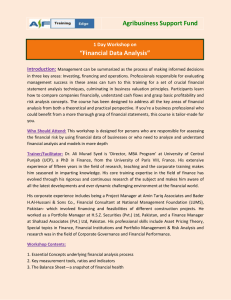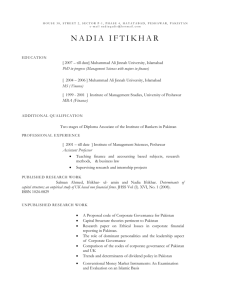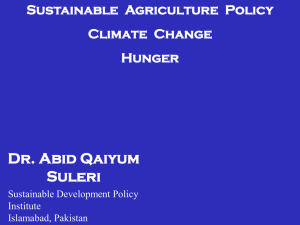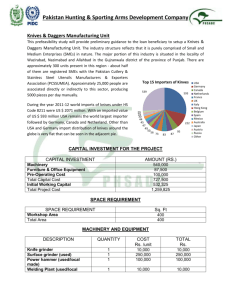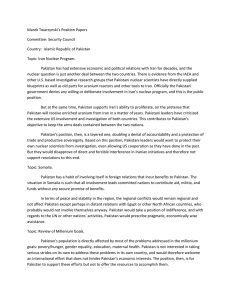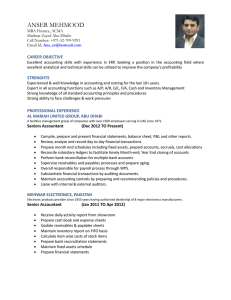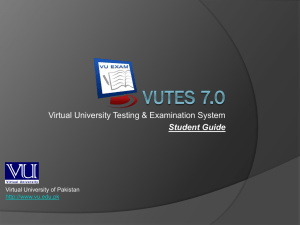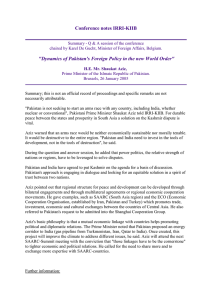The Nexus of Human Capital and Governance
advertisement
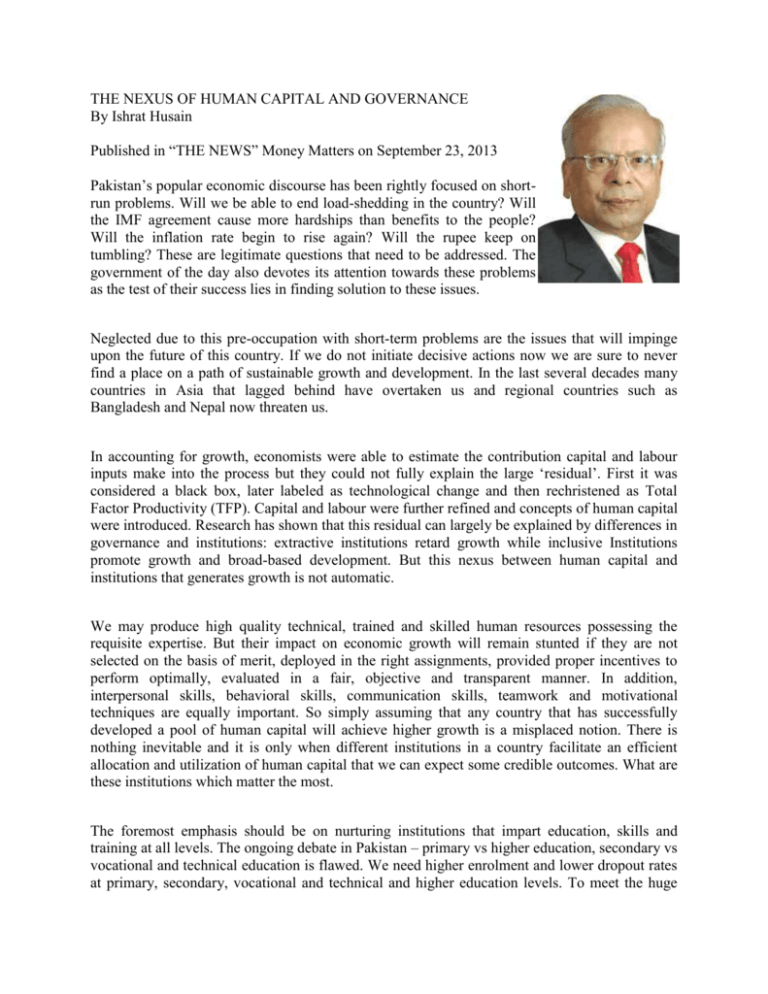
THE NEXUS OF HUMAN CAPITAL AND GOVERNANCE By Ishrat Husain Published in “THE NEWS” Money Matters on September 23, 2013 Pakistan’s popular economic discourse has been rightly focused on shortrun problems. Will we be able to end load-shedding in the country? Will the IMF agreement cause more hardships than benefits to the people? Will the inflation rate begin to rise again? Will the rupee keep on tumbling? These are legitimate questions that need to be addressed. The government of the day also devotes its attention towards these problems as the test of their success lies in finding solution to these issues. Neglected due to this pre-occupation with short-term problems are the issues that will impinge upon the future of this country. If we do not initiate decisive actions now we are sure to never find a place on a path of sustainable growth and development. In the last several decades many countries in Asia that lagged behind have overtaken us and regional countries such as Bangladesh and Nepal now threaten us. In accounting for growth, economists were able to estimate the contribution capital and labour inputs make into the process but they could not fully explain the large ‘residual’. First it was considered a black box, later labeled as technological change and then rechristened as Total Factor Productivity (TFP). Capital and labour were further refined and concepts of human capital were introduced. Research has shown that this residual can largely be explained by differences in governance and institutions: extractive institutions retard growth while inclusive Institutions promote growth and broad-based development. But this nexus between human capital and institutions that generates growth is not automatic. We may produce high quality technical, trained and skilled human resources possessing the requisite expertise. But their impact on economic growth will remain stunted if they are not selected on the basis of merit, deployed in the right assignments, provided proper incentives to perform optimally, evaluated in a fair, objective and transparent manner. In addition, interpersonal skills, behavioral skills, communication skills, teamwork and motivational techniques are equally important. So simply assuming that any country that has successfully developed a pool of human capital will achieve higher growth is a misplaced notion. There is nothing inevitable and it is only when different institutions in a country facilitate an efficient allocation and utilization of human capital that we can expect some credible outcomes. What are these institutions which matter the most. The foremost emphasis should be on nurturing institutions that impart education, skills and training at all levels. The ongoing debate in Pakistan – primary vs higher education, secondary vs vocational and technical education is flawed. We need higher enrolment and lower dropout rates at primary, secondary, vocational and technical and higher education levels. To meet the huge demands of primary and secondary school teachers higher education institutions are needed. Vocational and technical schools cannot operate if their entrants have not attended secondary schools. Higher education institutions should not produce hordes of unemployable graduates but those who can be absorbed into the labour force and contribute to the country’s overall productivity. For example, colleges for paramedics, nurses, paralegals, engineering support, laboratory technicians and other paraprofessionals should be set up. The challenge for access, quality and relevance of education is so overwhelming that it requires an “all hands-on-the deck” approach. This constitutional right to education under Article 25A has placed the responsibility upon the state. But it does not follow that the state has exclusive monopoly for provision of education. In a sense a free market approach should be applied in which there is competition among the various providers of education and the people are free to decide whichever way they want to go. In case of talented but needy students we should follow the Punjab Education Foundation (PEF) model where funding is provided by the government to low-income students for studying at the private school of their choice. These schools are tested every year for quality assurance purposes and those who do not meet this test are excluded from the list of eligible schools. Similar reforms are taking place in healthcare delivery institutions. Philanthropy in Pakistan has taken firm roots and is financing a number of well-established and new hospitals, clinics and medical facilities. Some philanthropists have taken the lead in improving the quality of certain wards and services in government hospitals, private interventions which are extremely helpful in filling in the gaps as well as supplementing public healthcare services. The other important gap pertains to institutions of science and technology. These institutions should be completely revamped and freed from bureaucratic shackles. Creativity and innovation rather than academic qualifications and length of service should form the basis for appointments, rewards and advancement. These institutions should have independent boards of directors for governance and oversight rather than being subordinate to the ministries and departments. Government and public sector, including defence forces employ about four million people or about 7% of the total labor force of the country. Most of the jobs are either self-employed or in the organised private sector. As long as the government provides an enabling environment for investment and businesses in terms of policy direction, macroeconomic stability, regulation and taxation, Pakistan’s enterprising private businesses will be able to create the quantum of jobs to absorb the educated and skilled manpower. In the process, they will be able to improve their own competitiveness by utilising qualified human resources efficiently. The problem arises when the government indulges in crony capitalism and favours its supporters and discriminates against others. In absence of a level playing field the whole environment becomes vitiated and an atmosphere of mistrust and hostility is spread stifling the growth of the private sector. Thus, it is imperative that the ruling political parties should desist from picking favourites and establish an enabling environment for business to thrive. Another set of institutions that require an overhaul are the civil services and their policies regarding recruitment, training, performance evaluation, compensation, benefits and severance. A “National Executive Service” open to competition from within and outside the government should be formed to attract the best available talent for higher policymaking and implementation. Decision-making is becoming more complex and both subject matter expertise and managerial skills are needed in this field. By using modern Information technology and streamlining outdated business processes, the government can an also introduce transparency, improve efficiency and facilitate access to public services. Public sector enterprises and corporations should be revisited and regrouped into those that have to be saved for strategic reasons and those that have to be privatised, wound up, liquidated, merged or transferred. Those retained in the public sector should be given clear goals, assigned key performance indicators and evaluated on the basis of their performance. These enterprises should be manned by the right people, selected on the basis of eligibility criteria, and given operational autonomy under the supervision of a board of directors and held accountable for the results. The role of the Planning Commission – a body responsible for the long-term direction of the economy, formulation of policies, programmes and development projects, resolution of interministerial claims in priority fixing, allocation of resources for these development priorities and monitoring implementation has weakened over time. A silo mindset characterises the current state of affairs and the allocation of resources out of PSDP is simply a reflection of this mindset. Poor design, cost overruns and delays in project completion undermine the benefits of development projects. The recent move to transform the commission into a think-tank for policy formulation and monitoring of implementation is a step in the right direction. The other key departments in which reforms are also urgently needed are the police, prosecution, prisons, judiciary, decentralization and devolution, accountability and taxation. Unless a more comprehensive and all-encompassing approach is adopted to reform these institutions, human capital will be misallocated and wasted and growth will remain elusive. The writer is a former governor of the State Bank of Pakistan Read more at: http://magazine.thenews.com.pk/mag/moneymatter_detail.asp?id=6204&magId=10&catId=30



